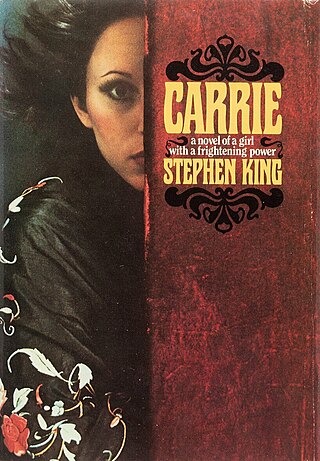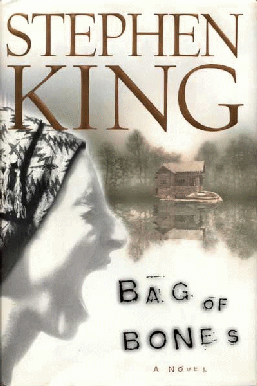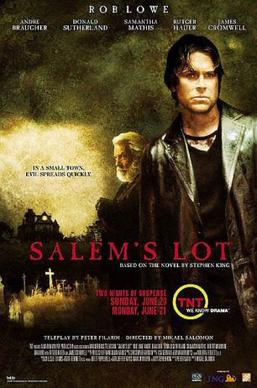
Stephen Edwin King is an American author of horror, supernatural fiction, suspense, crime, science-fiction, and fantasy novels. Called the "King of Horror", his books have sold more than 350 million copies as of 2006, and many have been adapted into films, television series, miniseries, and comic books. He has also written approximately 200 short stories, most of which have been published in book collections. His debut, Carrie, was published in 1974, and was followed by 'Salem's Lot, The Shining, The Stand and The Dead Zone. Different Seasons, a collection of four novellas, was his first major departure from the horror genre. The novellas provided the basis for the films Stand by Me and The Shawshank Redemption. King has published under the pseudonym Richard Bachman and has cowritten works with other authors, notably his friend Peter Straub and sons Joe and Owen King.

The Shining is a 1977 horror novel by American author Stephen King. It is King's third published novel and first hardcover bestseller; its success firmly established King as a preeminent author in the horror genre. The setting and characters are influenced by King's personal experiences, including both his visit to The Stanley Hotel in 1974 and his struggle with alcoholism. The novel was adapted into a 1980 film and a 1997 miniseries. The book was followed by a sequel, Doctor Sleep, published in 2013, which in turn was adapted into a film of the same name in 2019.

Night Shift is Stephen King's first collection of short stories, first published in 1978. In 1980, Night Shift won the Balrog Award for Best Collection, and in 1979 it was nominated as best collection for the Locus Award and the World Fantasy Award.

Carrie is a 1974 horror novel, the first by American author Stephen King. Set in Chamberlain, Maine, the plot revolves around Carrie White, a friendless, bullied high-school girl from an abusive religious household who discovers she has telekinetic powers. Feeling guilty for harassing Carrie, Sue Snell invites Carrie to the prom with Tommy Ross, but a humiliating prank during the prom by Chris Hargensen leads to Carrie destroying the town with her powers. The narrative contains fictional documents in approximately chronological order that present multiple perspectives on the prom incident and its perpetrator. Carrie deals with themes of ostracism and revenge, with the opening shower scene and the destruction of Chamberlain being pivotal scenes.

Vampire literature covers the spectrum of literary work concerned principally with the subject of vampires. The literary vampire first appeared in 18th-century poetry, before becoming one of the stock figures of gothic fiction with the publication of Polidori's The Vampyre (1819), which was inspired by the life and legend of Lord Byron. Later influential works include the penny dreadful Varney the Vampire (1847); Sheridan Le Fanu's tale of a lesbian vampire, Carmilla (1872), and the most well known: Bram Stoker's Dracula (1897). Some authors created a more "sympathetic vampire", with Varney being the first, and more recent examples such as Moto Hagio's series The Poe Clan (1972-1976) and Anne Rice's novel Interview with the Vampire (1976) proving influential.

'Salem's Lot is a 1975 horror novel by American author Stephen King. It was his second published novel. The story involves a writer named Ben Mears who returns to the town of Jerusalem's Lot in Maine, where he lived from the age of five through nine, only to discover that the residents are becoming vampires. The town is revisited in the short stories "Jerusalem's Lot" and "One for the Road", both from King's story collection Night Shift (1978). The novel was nominated for the World Fantasy Award in 1976 and the Locus Award for the All-Time Best Fantasy Novel in 1987.
"Quitters, Inc." is a short story by Stephen King published as part of his 1978 short story collection Night Shift. Unlike most other stories in this book, "Quitters, Inc." had been previously unpublished until February 1978 under Doubleday Publishing. It was featured in Edward D. Hoch's 1979 ‘Best detective stories of the year’ collection. The plot follows Dick Morrison's discovery of the brutal enforcement methods used by Quitters, Inc., the firm which he enlists to aid him quit smoking. Like much of Stephen King's work, this short story exhibits elements of horror fiction and satire. The tale was adapted in the 1985 American anthology horror film Cat’s Eye.
"Trucks" is a short story by Stephen King, first published in the June 1973 issue of Cavalier magazine, and later collected in King's 1978 collection Night Shift.
"Strawberry Spring" is a horror short story by Stephen King. It was originally published in the Fall 1968 issue of Ubris magazine, then republished in the November 1975 issue of Cavalier magazine, and, heavily revised, collected in King's Night Shift in 1978.

Bag of Bones is a 1998 horror novel by American writer Stephen King. It focuses on an author who suffers severe writer's block and delusions at an isolated lake house four years after the death of his wife. It won the 1999 Bram Stoker Award for Best Novel, the 1999 British Fantasy Award for Best Novel, and the 1999 Locus Award for Best Dark Fantasy/Horror Novel. The book re-uses many basic plot elements of Daphne du Maurier's Rebecca, which is directly referenced several times in the book's opening pages; however, the relation of these elements to the plot and characters is markedly different. When the paperback edition of Bag of Bones was published by Pocket Books on June 1, 1999 (ISBN 978-0671024239), it included a new author's note at the end of the book, in which Stephen King describes his initial three-book deal with Scribner, and devotes most of the piece describing the origins of the then-forthcoming Hearts in Atlantis.
"Sometimes They Come Back" is a short story by Stephen King, first published in the March 1974 issue of Cavalier and later collected in King's 1978 collection Night Shift.
"The Ledge" is a short story by Stephen King, first published in the July 1976 issue of Penthouse, and later collected in King's 1978 collection Night Shift.
"Jerusalem's Lot" is a short story by Stephen King, first published in King's 1978 collection Night Shift. The story was also printed in the illustrated 2005 edition of King's 1975 novel 'Salem's Lot.

Fear is a psychological thriller-horror novella by American writer L. Ron Hubbard, which first appeared in the magazine Unknown Fantasy Fiction in July 1940. While previous editions followed the magazine text, the 1991 Bridge edition reportedly restores the author's original manuscript text.

Salem's Lot is a 2004 American two-part television miniseries which first aired on TNT on June 20 and ended its run on June 21, 2004. It is the second television adaptation of Stephen King's 1975 vampire novel 'Salem's Lot following the 1979 miniseries adaptation.
"Big Wheels: A Tale of the Laundry Game " is a horror short story by Stephen King, first published in the 1980 anthology New Terrors, edited by Ramsey Campbell, and collected in King's 1985 collection Skeleton Crew. It was adapted from an unfinished novel called "The Milkman". The events in this story follow the events of the previously unpublished short story "Morning Deliveries ", which appears in the same collection.
A Cthulhu Mythos anthology is a type of short story collection that contains stories written in, or related to, the Cthulhu Mythos genre of horror fiction launched by H. P. Lovecraft. Such anthologies have helped to define and popularize the genre.

Trucks is a 1997 Canadian-American television horror film directed by Chris Thomson, which follows the story of a group of tourists and locals attacked by autonomous trucks and other inexplicable phenomena in a rural town. It is based on Stephen King's short story "Trucks", which also served as the source material for the earlier film Maximum Overdrive, the only film directed by King. Trucks aired on the USA Network on October 29, 1997.

Elizabeth Booth was born in 1674 and was one of the accusers in the Salem Witch Trials. She grew up in Salem, Massachusetts, as the second eldest of ten children. When she was sixteen she was accused of being a witch. When she was eighteen, she began accusing people of practicing witchcraft, including John Proctor, Elizabeth Proctor, Sarah Proctor, William Proctor, Benjamin Proctor, Woody Proctor, Giles Corey, Martha Corey, Job Tookey, and Wilmont Redd. Five of these people were executed due to Booth's testimony. Elizabeth Proctor would have been executed as well if she was not pregnant. After the Witch Trials, Booth married Israel Shaw on December 26, 1695, and had two children named Israel and Susanna. Booth's death date is unknown.

Jerusalem's Lot, Maine is a fictional town and a part of writer Stephen King's fictional Maine topography. 'Salem's Lot has served as the setting for a number of his novels, novellas, and short stories. It first appeared in King's 1975 novel 'Salem's Lot, and has reappeared as late as his 2019 novel The Institute. The town is described as being located in Cumberland County, between the towns of Falmouth, Windham, and Cumberland, near the southern part of the state about 10 miles north of Portland. A map on King's official website, though, places 'Salem's Lot considerably further north, approximately in Northwest Piscataquis.










